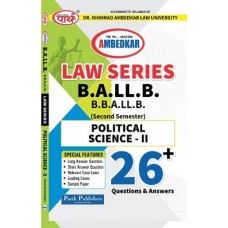- BA
- BA One Week Series(Rajasthan) HINDI Medium
- BA ONE WEEK SERIES (JNVU) HINDI MEDIUM
- BA ONE WEEK SERIES (JNVU) ENGLISH MEDIUM
- BA One Week Series(Rajasthan, Brij, Matsya, shekhawati) English Medium
- BA One Week Series(Shekhawati) HINDI Medium
- BA One Week Series(Shekhawati) English Medium
- BA ONE WEEK SERIES (UNIVERSITY OF KOTA) ENGLISH
- BA ONE WEEK SERIES (MDS) ENGLISH MEDIUM
- BA ONE WEEK SERIES (MGSU) ENGLISH MEDIUM
- BA UNSOLVED PAPER (RU)
- BA TEXT BOOKS
POLITICAL SCIENCE - II (AMBEDKAR UNIVERSITY)
POLITICAL SCIENCE - II (AMBEDKAR UNIVERSITY)
Rs. 100.00 Rs. 200.00
Inclusive Tax: Rs. 100.00
Inclusive Tax: Rs. 100.00
Product Details
BA-LLB 2nd Sem Political (According to Ambedkar University)
PAPER 2.2. POLITICAL THEORIES
SCHEME OF PAPER: MAX. MARKS: 100 MIN. PASS MARKS: 36 This paper shall consist of following two parts ; (a) Written paper — 70 marks (b) Internal examination — 30marks (15+10+5) Mid Semester Test: 15 marks Project/Assignment:10 marks Presentation: 05 marks The candidate must pass in part (a) and (b) separately. For passing, he shall be required to obtain 36 percent marks in each part, i.e. 25 marks out of 70 and 11 marks out of 30 marks. (1) The question paper shall be divided into two (02) Parts viz. Part – A and Part – B. (2) Part – A shall consist of five (05) compulsory questions of two (02) marks each whereas Part – B shall consist of seven (07) questions. The Candidate is required to attempt any four (04) questions. All questions carry equal marks. (3) The prescribed syllabus includes latest amendments in the subject wherever applicable.
OBJECTIVES OF THE COURSE: To establish a relationship between Political Science and Law and in the process bring out the significance of Political Science in strengthening the understanding of Law. The subject will facilitate conceptual clarity and also will provide a theoretical understanding of key themes which are central to the subject of Law. In addition to this, Political Science as an academic discipline will familiarise with ideologies which will play a vital role in moulding the thought process of law students and which will have its effect while dealing with the practical aspect of Law.
UNIT - I Meaning and definition of Political Theory; Significance of Political Theory; Impact of Political Theory on Society and Law; Approaches to the study of Political Theory: Traditional Approaches – Philosophical- Historical- Legal- Institutional, Contemporary Approaches – Positivism, Constructive and Communitarian Political Ideology; Major Ideologies; Liberalism, Marxism, Idealism, Socialism, Nationalism, Internationalism, Fascism
UNIT - II Ancient Indian Political Thought: Manu: Manu Smriti; State: Origin, Organs, Functions, King: Character, Powers; Law and Justice Kautilya; Arthashastra: Law and justice, Danda, Foreign Policy
UNIT - III Greek Political Thought: Plato; Theory of Justice; Ideal State: Aristotle; Theory of State, Classification of Government; Roman Political Thought: Features; Cicero.
UNIT - IV Medieval Political Thought: St. Thomas Augustine: State and Church; St. Thomas Acquinas: Law; Modern Political Thought: Machiavelli; Human Nature, King, Law; J.S. Mill: Liberty, Karl Marx: Dialectical Materialism, Class Struggle, State.
UNIT - V Modern Indian Political Thought: Features. Mohandas Karamchand Gandhi: Truth, Non–Violence, Satyagraha, Philosophical Anharchism; Trusteeship; Jawahar Lal Nehru: Democracy, Socialism, Tilak: Swaraj Veer Sarvarkar– Political Ideas, J.P. Narayan: Sarvodaya Total Revolution.
Powered By PAWAN SHARMA
Online Book Mart © 2024






